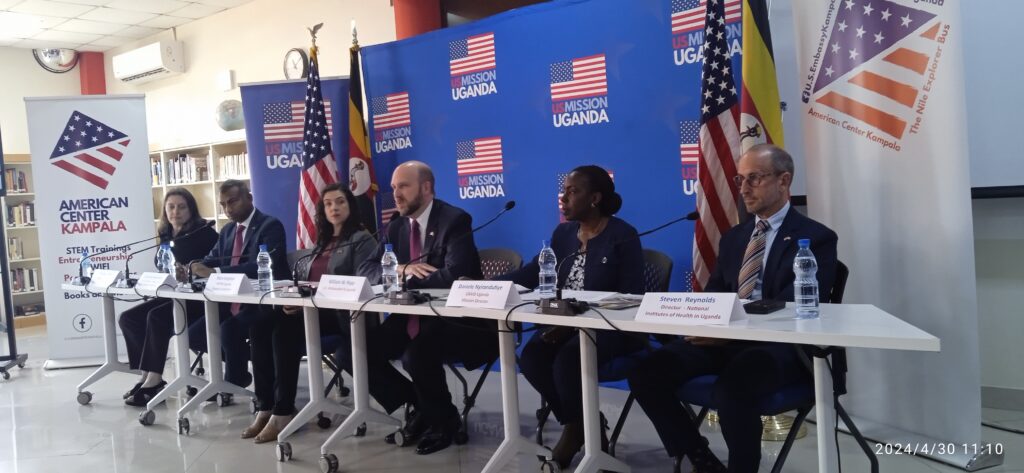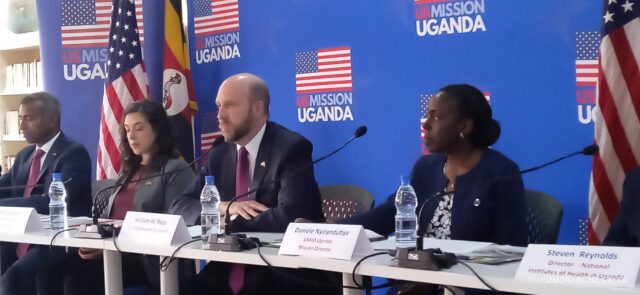
The American Embassy in Uganda has revealed how far it has gone in issues concerning supporting the health system of Uganda. The report shows that over 1.3 million people benefit from the support offered by the US American Embassy.
According to the report, the American Embassy has supported Uganda’s health system through prevention, treating and caring of diseases such as Malaria, HIV/AIDS, Cancer among others through implementing projects including training community health workers and extending health care services which has positively impacted people health since the trained community workers have been able to train people on health issues.
During a press briefing at the American center offices in Kampala, The US Ambassador to Uganda William .W. Popp said that the support they have offered to Uganda has helped to improve the health of Ugandans, noting the fight against Malaria where 3.2 million Ugandans have benefited from the assistance provided. He added that this include test kits, training teams among other forms of assistance.
He stressed that Malaria is a challenging disease but they have seen positive results from the high burdened communities from malaria prevention activities through community based approaches, spraying, training people about vegetation indicating positive results. He added that it requires consistent approach since it is very easy for mosquito to come back.
USAID Uganda Mission Director Daniele Nyirandutiye noted that they are still putting in more efforts to see that people respond and comply to the medicines and treatment given to them so that they get better lives. In this, they are working closely with the government to provide information to the people so that they are not afraid in case medicines are brought.
Director CDC Uganda Dr. Army Boore noted that they have been able to support Uganda to create her own Laboratory accreditation services so Uganda no longer has to rely and pay for lab accreditation to be done by other countries and researchers.
Dr. Vamsi Vasireddy, the country Director Walter Reed Army institute of research expressed that the collaboration with Ugandan Institutes such as Makerere University and the Infectious disease institute has helped them reach the objectives of health security such as active surveillance, HIV vaccine research and trials to explore new types of HIV vaccine candidates, and health services delivery through services, medicines, and Health workers delivered to hard to reach areas such as Islands of Buvuma, Mukono, and others.
The Uganda country Coordinator of PEPFAR Mary Borgmann noted that they have been able to implement PEPFAR around the country and ensure that the services reach the vulnerable people as over 1.3 million people benefit from HIV prevention, caring and treatment, cervical cancer screening where over the last 3years, newly 650,000 women living with HIV get the opportunity for cancer screening and those diagnosed with positive results are referred for treatment, treating TB patients among other services.
The Director for National Institute of Health in Uganda Steven Reynolds stressed that they aim at training the next generation of Ugandan scientists through offering training grants to Ugandan institutions to train Ugandan scientists at the Masters in PHD level to be able to work for good health of Ugandans especially when new emerging health threats occur.
However, on issues concerning why women in rural areas don’t use modern family planning methods, the Director of Healthcare offices at USAID Jessica Healey noted that over the past 5 years, they have not seen tremendous improvement in the uptake of modern contraceptives. She added that USAID procures over 6.3 million dollars worth of family planning commodities every year but it doesn’t fully meet the need.
Therefore USAID is working to see that they offer more training to community health workers since they can easily reach out to women.
Meanwhile, USAID/Uganda signed a memorandum of understanding with Strong Minds Uganda showing a joint commitment to furthering mental health advocacy, policy and services in Uganda.
They made a commitment to improve mental health well being for Ugandan citizens, to increase local capacity to provide community based mental health services, to foster public-private collaboration on mental health throughout Uganda among other commitments.






